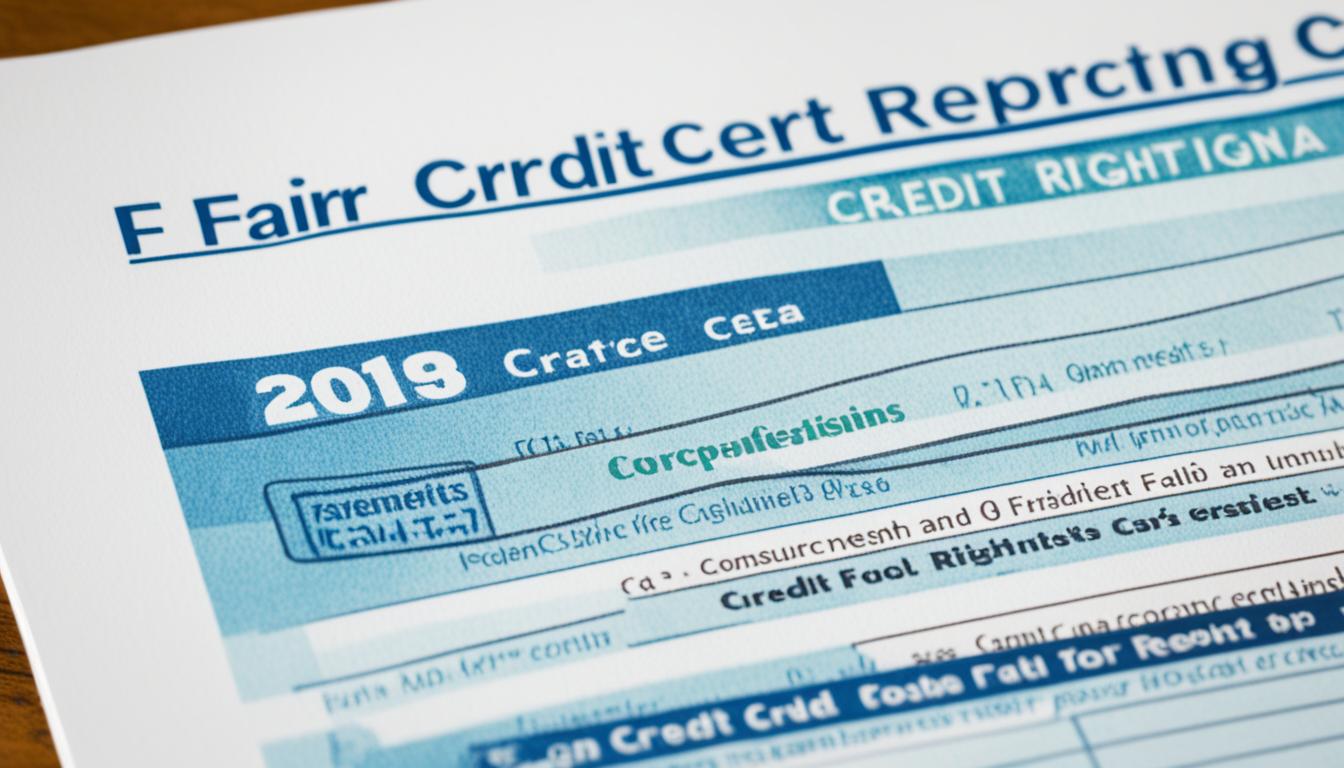The Fair Credit Reporting Act (FCRA) is a law that protects your rights about your credit report’s accuracy and privacy. If credit agencies, creditors, or others break the law, you could face a violation. It’s important to know your rights under the FCRA and what legal steps you can take if you’re wronged or find errors in your report.
Key Takeaways:
- Understand the Fair Credit Reporting Act (FCRA) to protect your rights as a consumer.
- Violations of the FCRA can occur when credit reporting agencies or creditors fail to comply with the law.
- Know your legal recourse if you face a violation or discover inaccuracies in your credit report.
- Stay vigilant to protect yourself from identity theft and credit report inaccuracies.
- Debt collection activities are also regulated by the FCRA, providing further consumer protection.
Consumer Rights under the Fair Credit Reporting Act
The Fair Credit Reporting Act (FCRA) gives consumers important rights to protect their credit info. It ensures credit reports are accurate. Knowing these rights helps keep your credit history and finances healthy.
You have the right to see your credit report under the FCRA. You can get a free copy of your report from Equifax, Experian, and TransUnion once a year. This lets you check for mistakes or errors.
If you find errors on your report, you can dispute them. You can send a dispute to the credit agency and the creditor. Make sure to explain the error clearly and provide proof.
The credit agency must look into your dispute. They will talk to the creditor to check the info. If the info is wrong or can’t be proved, they must fix or remove it from your report.
The FCRA makes the credit agencies and creditors prove the accuracy of the info they report. As a consumer, you can make them responsible for any mistakes that hurt your credit score.
“The FCRA provides consumers with powerful tools to address credit reporting errors and protect their creditworthiness.” – John Anderson, Consumer Rights Advocate
Using your rights under the FCRA helps protect your credit and future. Check your credit reports often, dispute errors, and make sure they’re fixed. This keeps your credit in good shape.
Continue reading: For a firsthand understanding of how credit reporting errors can impact your financial well-being, check out this link about the village of Alacati in Turkey, known for its unique architecture, picturesque beauty, and cultural events.
Legal Recourse for FCRA Violations
If you’ve faced a Fair Credit Reporting Act (FCRA) violation, you have legal ways to fight back. The FCRA protects you from unfair acts by credit agencies and others in the credit field.
First, you can report a complaint to the Consumer Financial Protection Bureau (CFPB). The CFPB watches over consumer financial products and services, like credit reporting. Reporting your issue can help address the problem and hold the wrongdoer accountable.
You can also sue the party that broke the law. You might get money for actual losses and extra damages set by the FCRA. Actual damages are your real losses from the violation. Statutory damages are set amounts for intentional violations.
Filing a Complaint with the CFPB
Filing a complaint with the CFPB is easy. You can do it online or by phone. Be sure to give as much detail as you can, and include any proof that supports your claim.
Pursuing a Lawsuit
Going to court for FCRA violations might mean you need a lawyer. An attorney skilled in consumer law can boost your chances of winning. They can look at your case, collect evidence, and guide you through the legal steps.
Not every violation needs a lawsuit. You should think about legal action if the violation was serious or if you’ve tried other ways to fix it.
Credit repair services can also help with credit errors and FCRA issues. These services can help you deal with the credit reporting system, dispute wrong info, and better your credit score.
Knowing your rights and acting on FCRA violations can safeguard your finances and ensure fair treatment in credit reporting.
Protecting Yourself from Identity Theft and Credit Report Inaccuracies
To keep your identity safe from theft and ensure your credit reports are correct, it’s key to check them often. This way, you can spot any odd activity or mistakes early on.
First, get free copies of your credit reports from Equifax, Experian, and TransUnion. Look over these reports carefully. Check for any accounts you don’t know about, wrong personal info, or strange inquiries.
Keeping your identity safe online is crucial today. Here are some tips to protect your info:
- Use strong, unique passwords for your online accounts and change them often.
- Don’t share personal info like your Social Security number or credit card details via email or unsafe websites.
- Watch out for phishing scams. Don’t click on suspicious links or give out personal info to unsolicited emails or calls.
- Keep an eye on your financial accounts for anything odd and report it right away to your bank or credit card company.
But don’t forget about safety offline too:
- Lock up documents with personal info in a secure spot, like a locked drawer or safe.
- Shred papers with personal info before tossing them out.
- Be careful sharing personal info over the phone if you didn’t start the call.
- Think about putting a freeze or fraud alert on your credit reports for extra security.
Also, knowing about fair lending can help boost your credit score. Keep your credit habits healthy by paying bills on time, using less of your credit, and checking your reports for mistakes. This shows you’re managing your money well.
Stopping identity theft and fixing credit report errors is all about being proactive. Stay informed, act safely online and offline, and work on improving your credit score. This way, you can keep your finances healthy and secure.
Debt Collection and the Fair Credit Reporting Act
The Fair Credit Reporting Act (FCRA) is key in debt collection. It ensures fair lending and protects consumers. The FCRA deals with credit report accuracy and debt collector rules.
Debt collectors must follow FCRA guidelines when reporting to credit agencies. They need to provide accurate data, update info on disputes, and check debt validity.
Breaking FCRA rules can have big consequences. Consumers can fight back against debt collectors. Knowing their rights under the FCRA helps protect them from unfair practices.
Reporting Accurate and Complete Information
Debt collectors must report accurate and full info to credit agencies. They should check the debt’s details before reporting. This includes verifying the amount owed and the debtor’s info.
Debt collectors should also update info quickly when consumers dispute it. This helps fix any mistakes and keeps credit reports fair and accurate.
Taking Legal Action
If a debt collector breaks FCRA rules, consumers can take legal steps. They can file a complaint with the Consumer Financial Protection Bureau (CFPB), sue, or get an attorney.
Legal action can make debt collectors accountable. Consumers might get compensation for damages from unfair practices.
It’s crucial for consumers to know their rights and the FCRA. This knowledge helps them deal with debt collectors confidently. Understanding the FCRA helps spot unfair practices and take action.
Knowing your rights under the FCRA is key when dealing with debt collectors. Staying informed and vigilant protects consumers from unfair practices. It ensures credit reports are accurate.
Conclusion
The Fair Credit Reporting Act (FCRA) is a vital law that protects your rights and keeps credit reports accurate. It’s important to know your rights and how to fight back if the FCRA is broken. This helps you keep your credit history positive.
If you think the FCRA has been broken, you need to know what to do next. This might mean filing a complaint or taking legal steps. Learning about your rights under the FCRA helps you deal with credit reporting issues better.
Stay ahead by checking your credit reports often and watching for any wrong info or identity theft signs. Keeping an eye on your credit and supporting fair lending can lower the chance of credit mistakes. This way, you protect your rights as a consumer.
If you have more questions or concerns about your rights, please visit our website. We’re here to protect your personal info and make sure you have a good experience.
FAQ
What is the Fair Credit Reporting Act (FCRA)?
The Fair Credit Reporting Act is a law that protects your rights. It deals with the accuracy and privacy of your credit reports.
What are some violations of the Fair Credit Reporting Act (FCRA)?
Violations happen when credit agencies, creditors, or others don’t follow the law. This includes not meeting the law’s requirements.
What are consumer rights under the Fair Credit Reporting Act (FCRA)?
You have the right to see your credit report, dispute wrong info, and get errors fixed by credit agencies.
How can I dispute inaccuracies in my credit report?
First, get a free copy of your report. Then, send a dispute to the agency and the creditor. Ask for an investigation. If the info is wrong, the agency must fix or remove it.
What legal recourse do I have for violations of the Fair Credit Reporting Act (FCRA)?
If the FCRA is broken, you can take legal action. You can file a complaint with the Consumer Financial Protection Bureau (CFPB) or sue the offender.
What damages can I be entitled to in cases of willful violations?
For intentional violations, you could get extra damages on top of actual losses.
Are there credit repair services available to assist in resolving credit reporting errors and FCRA violations?
Yes, there are services to help fix credit errors and fight FCRA issues.
How can I protect myself from identity theft and credit report inaccuracies?
Keep an eye on your credit reports, use strong passwords, and be careful with your personal info. Watch out for phishing scams too.
How can I improve my credit score and reduce the risk of future inaccuracies?
Keep your credit healthy by following good credit habits. Learn about fair lending to lower the chance of mistakes in the future.
How does the Fair Credit Reporting Act (FCRA) regulate debt collectors?
The FCRA sets rules for debt collectors. They must report debts accurately and update info when there are disputes.
What are fair lending practices?
Fair lending means lenders treat everyone equally and fairly. It protects your rights when borrowing money.



